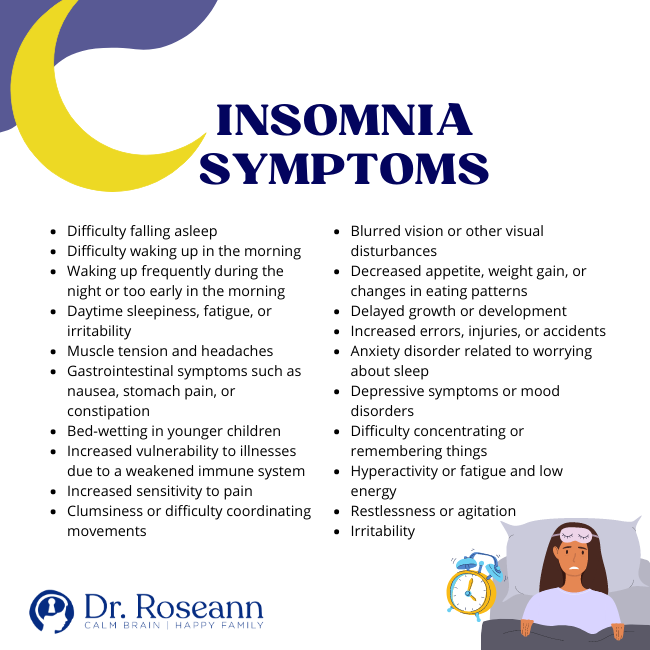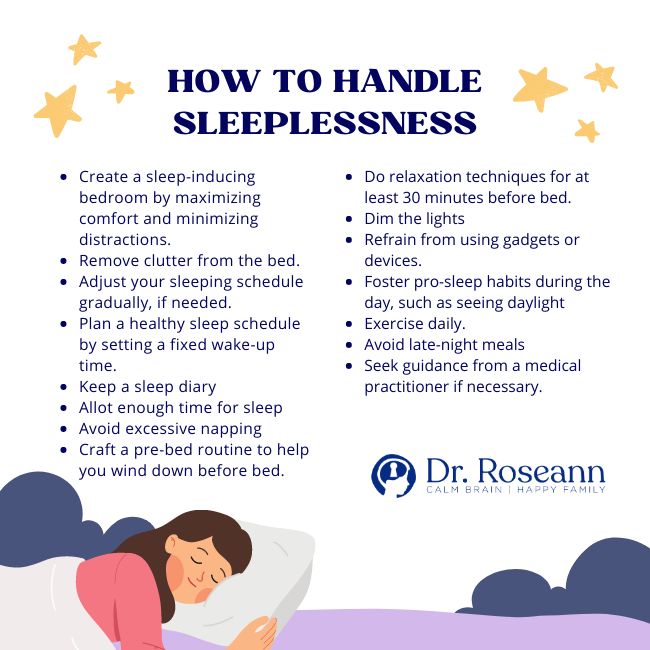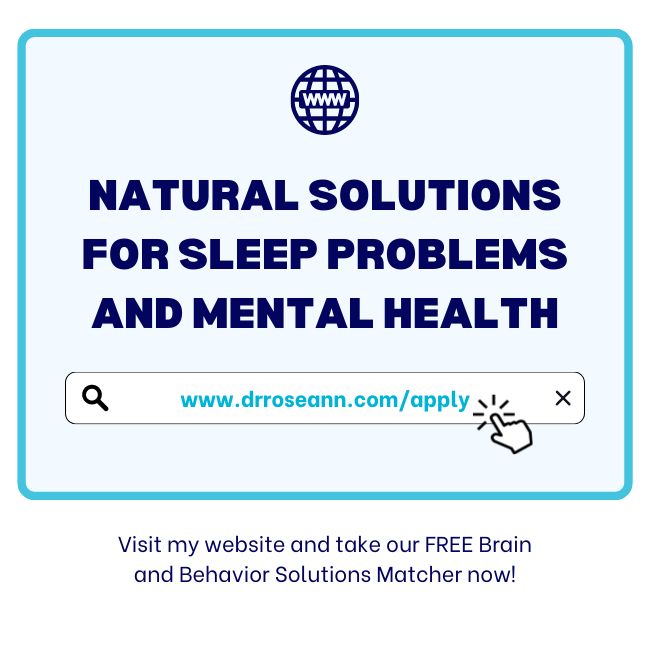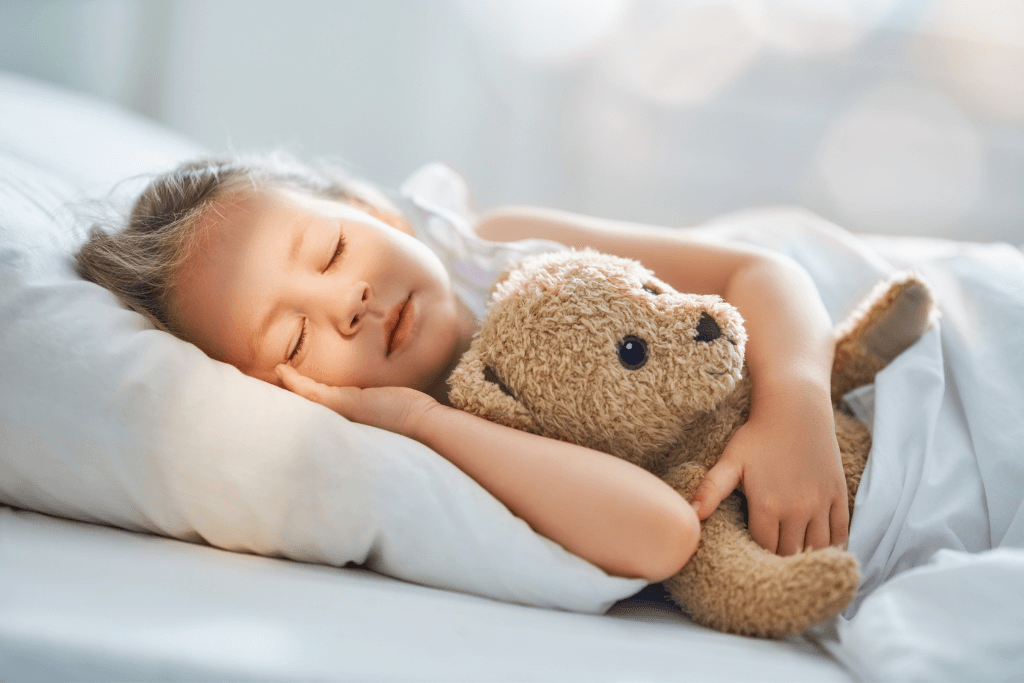Is your child struggling to focus during the day due to lack of sleep? Do they usually find it hard to fall asleep at night despite being exhausted? Maybe your child wakes up exhausted after tossing and turning all night?
Then they may have a sleeping disorder like insomnia. Insomnia affects millions of people, including children and teens, and sleep deprivation can profoundly impact one’s daily life.
Insomnia can have a huge impact on attention and cognitive function. When you aren’t sleeping, the brain's ability to focus, concentrate, and remember things is compromised.
Your child may complain of feeling like they are in a “brain fog” or they “can’t remember anything” after extended periods of poor sleep. Often, parents have no idea their kids are poor sleepers and instead may wonder if their child has an attention problem.
What is Insomnia?

Insomnia is a prevalent sleep disorder that affects the ability to fall asleep, stay asleep, or obtain restful sleep despite appropriate sleeping conditions. This condition can hinder daily activities and result in daytime sleepiness for both kids and adults.
We often don’t think of kids as having insomnia but short-term insomnia can result from stress or environmental changes and may persist for several days or weeks. On the other hand, chronic insomnia occurs more frequently, up to three or more nights per week, for more than three months. It also cannot be attributed to underlying health issues.
Aside from insomnia, other sleep disorders may hinder one's ability to rest at night. Two examples are circadian rhythm disorder and obstructive sleep-disordered breathing.
Circadian rhythm disorder, also known as sleep-wake cycle disorder, arises when there is a misalignment between the body's internal clock. Our body clock, or the internal circadian clock, regulates the timing of sleep and wakefulness in sync with one's environment.
Obstructive sleep-disordered breathing is a sleep-related condition that manifests as a dysfunction in the upper airway during sleep. It leads to snoring or heightened respiratory effort due to increased resistance in the upper airway and a tendency to collapse in the pharynx.
On the other hand, obstructive sleep apnea is a sleep disorder characterized by reduced or complete cessation of airflow despite continued breathing effort (Memon & Manganaro, 2023). It is surprisingly common and I have had many children that I have worked with have obstructive sleep apnea that result in behaviors that look like ADHD.
Insomnia Symptoms
If kids are accustomed to being in a state of high alertness, they find it difficult to fall asleep for prolonged periods. Here are the general symptoms of insomnia in children:
- Difficulty falling asleep
- Difficulty waking up in the morning
- Waking up frequently during the night or too early in the morning
- Daytime sleepiness, fatigue, or irritability
- Muscle tension and headaches
- Gastrointestinal symptoms such as nausea, stomach pain, or constipation
- Bed-wetting in younger children
- Increased vulnerability to illnesses due to a weakened immune system
- Increased sensitivity to pain
- Clumsiness or difficulty coordinating movements
- Blurred vision or other visual disturbances
- Decreased appetite, weight gain, or changes in eating patterns
- Delayed growth or development
- Increased errors, injuries, or accidents
- Anxiety disorder related to worrying about sleep
- Depressive symptoms or mood disorders
- Difficulty concentrating or remembering things
- Hyperactivity or fatigue and low energy
- Restlessness or agitation
- Irritability
How Does Insomnia Affect Cognitive Abilities?
Sleep disturbance, deprivation, and disruption can affect the hippocampus, the brain region responsible for forming and storing memories. Studies have shown that sleep-deprived individuals have reduced hippocampal activity, which can impair their ability to create new memories (Prince & Abel, 2013).
Chronic insomnia can lead to long-term brain structure and function changes, including reduced prefrontal cortex and hippocampus gray matter volume. These are the areas responsible for attention, so it makes sense that many of the children that I have seen with sleep disorders show ADHD-like behaviors.
During sleep, the brain processes and consolidates information acquired during the day, and when individuals do not get enough sleep, this process can be interrupted or incomplete. It can lead to a decreased ability to concentrate and process information quickly, slowing brain processing.
In addition, insomnia can also increase stress hormones, such as cortisol, which can interfere with cognitive function. It can result in difficulties with attention, memory, and decision-making.
I recall a totally hyperactive boy named Philip that until he got his tonsils and adenoids removed looked like he had the worst case of ADHD. Thankfully the surgery changed his sleep and behavior.
How Does Insomnia Affect Behavior?
When children with insomnia do not get enough sleep, they may experience behavioral difficulties and negative mood changes, such as irritability, apathy, and lack of motivation. These negative mood changes can make it more difficult for them to engage in daily tasks and activities.
For Phillip, he wasn’t just hyperactive, he was moody and easily upset. Even with school accommodations, he kept getting in trouble. Just about every day, his parents got a call about his “impulsive behavior.”
In addition, insomnia can also lead to increased stress and anxiety, which can further impair motivation. When you don’t sleep, you often grind your teeth, toss and turn and your body gets tense and that really can make someone feel super anxious. It also affects the muscles responsible for speech production, resulting in slurred speech. Additionally, since it can cause fatigue and exhaustion, it becomes more difficult for children to speak clearly and articulately.
When you don’t sleep, you may feel anxious or worried about their sleep difficulties and most certainly worry every night if you will sleep through the night. That creates a horrible cycle of worry.
Insomnia can also affect the nervous system leading to a sympathetic dominant state, which directly causes increased emotionality, tantrums, and avoidant and impulsive behaviors. Sleep is so important for a calm brain and regulated nervous system.
The Insomnia ADHD connection
Attention issues are highly associated with ADHD or Attention Deficit Hyperactivity Disorder. As kids with insomnia exhibit ADHD symptoms, their behavioral needs increase and they experience difficulties at school.
As I saw with Philip, insomnia can have a significant impact on attention, causing ADHD-like symptoms. When we don't get enough sleep, our brain's ability to focus, concentrate, and remember things simply isn’t optimal.
Insomnia can impair one's ability to focus on a task or activity for an extended period. It's why people with insomnia get easily distracted or unable to concentrate on a particular task, which is also an ADHD trait but in this case results from poor sleep.
Insomnia can also make it challenging to filter out irrelevant stimuli. It can really ramp up sensory issues. Hannah was a child I worked with whose sensory issues were off the charts when she didn’t sleep. When in sensory overload, it becomes difficult to prioritize important information and ignore distractions. It makes multitasking and switching between different tasks or activities complex.
Children and teens with this condition may struggle to complete even simple tasks, which can be frustrating and impact productivity. Other than ADHD, chronic sleep deprivation has been linked to long-term cognitive impairment and an increased risk of developing cognitive disorders such as Alzheimer's disease.
One study evaluated 252 adults with different presentations of ADHD for insomnia using the DSM-5 scale. The study has revealed that 44.4% of the patients suffer from insomnia disorder, with higher prevalence found in patients with combined presentation (64.3%) and greater ADHD severity (Fadeuilhe et al., 2021).
Why Does Insomnia Affect Your Mental Health?
Sleep is essential for various bodily processes. The brain and body need to shut down too! It is necessary for you to pay attention and simply think. More importantly, adequate sleep is critical for neuroplasticity, the brain's ability to adapt when learning or experiencing new things.
If we don't get enough sleep, our learning, memory, and attention may become impaired, and our reflexes may slow down, making it difficult to respond quickly to physical stimuli. It’s why getting enough sleep is crucial for maintaining our well-being.
It is no surprise that the majority of my clients with anxiety, OCD or depression, struggle with sleep. Busy minds have a hard time powering down and that means one can’t be their best selves after a night of little sleep.
Why Does Sleep Deprivation Cause Mental Health Issues?
The brain processes and evaluates emotions during sleep, particularly in the rapid eye movement (REM) phase. Insufficient sleep can increase the likelihood of experiencing negative emotions, a risk factor for mental health issues such as suicidal thoughts or behavioral problems.
The different stages of sleep are critical for brain function and overall health because they enable various parts of the brain to activate or deactivate. Sleep promotes clear thinking, better learning, and improved memory retention.
Furthermore, research has revealed that brain activity during sleep can significantly influence our emotional regulation and mental well-being (Vandekerckhove & Wang, 2017).
Lastly, almost 90% of brain detoxification occurs during sleep and without proper detoxification, inflammation can result. And brain inflammation is associated with just about every mental health condition including, anxiety, OCD, depression, autism, PANS/PANDAS, etc.
Can Severe Insomnia Make You “Insane”?
That is actually a question I get all the time because of how awful people feel with chronic insomnia. Sensory issues, trouble thinking, physical pain and anxiety are common side effects of insomnia.
Chronic insomnia can cause several adverse effects on mental health, including depression, anxiety, and cognitive impairment. In some rare cases, severe and untreated insomnia can cause psychotic symptoms such as delusions or hallucinations.
As sleeplessness increases, psychotic symptoms can manifest, starting with minor visual or somatosensory distortions and progressing to hallucinations and delusions, ultimately resembling acute psychosis. Fortunately, these symptoms resolve once the individual gets some sleep (Waters et al., 2018).
And there are many reasons why someone could have a bout of insomnia including physical issues, so not ignoring insomnia is important or it could lead to more serious clinical problems.
How is Insomnia Related to Depression and Anxiety?
Insomnia and mental health disorders such as depression and anxiety are closely related. Insomnia can be both a symptom and a cause of depression and anxiety. Additionally, depression and anxiety can exacerbate insomnia, creating a vicious cycle of poor sleep quality and mental health problems.
If you don’t have the sleep to “feed the brain” then it is going to be hard to deal with challenges. It is a lot easier to be patient with oneself and others when you are rested.
Sleep disturbance in depression is a prevalent and distressing issue, which can be challenging to resolve through treatment. It signifies significant changes in brain neurotransmitter function and impaired quality of life, leading many sufferers to seek further treatment (Nutt et al., 2008).
Due to this, there is a pressing need for more effective management of sleep disturbance in depression to enhance patients' quality of life and reduce the risk of depressive relapse and recurrence.
As noted before, children and adults alike that I support in our program typically have sleep problems that serve as exacerbators to their clinical issues. Prioritizing sleep and following a sleep hygiene protocol can help tremendously.
How to Handle Sleeplessness

Healthy sleep patterns are crucial for regulating mood. Poor sleep can occur due to insufficient sleep habits that interfere with getting to sleep or staying asleep. However, sleep hacks can enhance sleep duration and quality, especially for children who may not yet have developed healthy sleep habits.
Prioritizing good sleep is crucial. Parents can benefit from these tips. Here are some practical ways to promote sleep:
- Create a sleep-inducing bedroom by maximizing comfort and minimizing distractions.
- Remove clutter from the bed.
- Adjust your sleeping schedule gradually, if needed.
- Plan a healthy sleep schedule by setting a fixed wake-up time.
- Keep a sleep diary
- Allot enough time for sleep
- Avoid excessive napping
- Craft a pre-bed routine to help you wind down before bed.
- Do relaxation techniques for at least 30 minutes before bed.
- Dim the lights
- Refrain from using gadgets or devices.
- Foster pro-sleep habits during the day, such as seeing daylight
- Exercise daily.
- Avoid late-night meals
- Seek guidance from a medical practitioner if necessary.
Natural Treatments for Insomnia and Attention Problems
Insomnia rates are increasing due to factors such as daily stress, excessive exposure to EMF from electronic devices, unhealthy diet, lack of physical activity, hormone and thyroid imbalances, adrenal fatigue, infectious diseases, and autoimmune disorders.
Our modern lifestyle often involves a lack of downtime and healthy sleep habits, making it harder to combat the issue of insomnia. Instead of using stimulant medications, it's better to use natural solutions for insomnia and attention as they don't have side effects. Here's what you can use to create an effective treatment plan:
1. Neurofeedback
Brain wave patterns and functioning are affected by insomnia. QEEG can help identify areas of dysfunction, while neurofeedback can target those areas and directly improve brain wave activity through reinforcement. After several sessions, the symptoms of insomnia are reduced.
Phillip’s insomnia was so significant that we did a short course of neurofeedback to help restore his brain wave activity more quickly to a healthy state.
One study supported the growing belief that neurofeedback may be an effective therapy for many neuropsychological and medical conditions, including insomnia. Unlike current treatments, which often lack functional recovery, are costly, and come with a risk of significant complications, neurofeedback has the potential to provide substantial benefits with no negative effect (Lambert-Beaudet et al., 2021).
2. PEMF
PEMF and biofeedback are therapeutic techniques that relax the Central Nervous System (CNS). According to the body's natural physiological response to stress, the CNS prioritizes stress management over healing.
Therefore, by inducing a state of relaxation in the CNS, PEMF therapy creates a favorable environment for the body to heal, decrease stress levels, and significantly improve sleep quality. In addition, CALM PEMF™ is a mobile device that can help regulate the CNS wherever you go.
3. Cognitive Behavioral Therapy (CBT)
Cognitive Behavioral Therapy and psychoeducation for children and teens can help address the neurocognitive, neuropsychiatric, and physical problems related to sleep issues. If distressing thoughts are preventing them from sleeping, therapy may be needed. I frequently see that teens have a lot on their plates and stay up doing homework and being on their devices and then struggle to settle for sleep.
Other modalities may be combined with CBT to achieve the best results and to modify negative attitudes, beliefs, and behaviors that affect sleep. The goal is to help your child achieve better sleep and overall well-being.
4. Nutrition and Supplementation
Dietary nutrition has a crucial role to play in promoting healthy sleep. Various foods and nutritional supplements can be used to promote quality sleep. Some nutrients necessary for restful sleep are Omega-3 and 6, amino acids such as Tryptophan, Gamma-Aminobutyric Acid and Glutamine (GABA), Tyrosine, and Vitamins D, C, B6, and B12 (Zhao et al., 2020).
Eating a diet rich in these nutrients calms the brain and gives the body what it needs. They also support the adrenal glands that play a part in how one manages stress.
In a clinical trial involving 46 elderly participants, one group was given magnesium supplements while the other a placebo. The experiment lasted for eight weeks, during which the magnesium control group received 500 mg of magnesium daily while the other group received a placebo.
The results showed that the magnesium group had statistically significant increases in sleep time, sleep efficiency, and melatonin levels compared to the placebo group. Furthermore, the magnesium supplementation group exhibited slightly reduced early morning waking (Abbasi et al., 2012).
Whenever I have a child or adult who struggles with insomnia, I often recommend magnesium to support the autonomic nervous system (ANS) and help one calm the brain and body for sleep.
Is Insomnia A Mental Disorder?
While it is not classified as a mental disorder, chronic insomnia can significantly impact mental health. But then, insomnia is recognized as a medical condition and must be treated by healthcare professionals.
As parents, we should be concerned about sleep deprivation and its impact on focus and attention and our kid’s overall mental health. The correlation between sleep and concentration is a subject that deserves our immediate concern.
While getting 7-9 hours of sleep seems easy, not every kid can do it. Knowing where to begin can be challenging, but gradually changing your child's sleep habits is a good starting point. Adjust your child’s sleep schedule and find the best sleep routine that works for them.
If your child is suffering from insomnia, we can help. We only use science-backed natural solutions to address sleep disorders and neurodevelopmental disorders like ADHD, OCD, anxiety, depression, and PANS/PANDAS.
Natural Solutions for Sleep Problems and Mental Health

As a parent of a child with anxiety, OCD, ADHD, or mood issues, you understand the unique challenges of managing their sleep problems. Unfortunately, navigating the traditional mental health system can be difficult and frustrating. That's why we offer personalized solutions for your child and family through our solution matcher tool.
We understand that every child is unique, so we tailor our BrainBehaviorReset™ Program to meet their needs. With our program, your child can learn to regulate and calm their brain, reducing impulsive behaviors and promoting healthier sleep patterns.
But our program isn't just about helping your child – it's also about empowering you as a parent. We'll teach you how your child's brain works and how you can shape and reinforce positive behaviors without shame or blame.
Finding a supportive community can also be crucial for you and your child. Our free natural parenting community is a great place to connect with other parents who understand what you're going through and can offer support and advice. So why take the first step and join us today?
Citations
Abbasi, B., Kimiagar, M., Sadeghniiat, K., Shirazi, M. M., Hedayati, M., & Rashidkhani, B. (2012). The effect of magnesium supplementation on primary insomnia in elderly: A double-blind placebo-controlled clinical trial. Journal of Research in Medical Sciences: The Official Journal of Isfahan University of Medical Sciences, 17(12), 1161–1169. https://www.ncbi.nlm.nih.gov/pmc/articles/PMC3703169/
Fadeuilhe, C., Daigre, C., Richarte, V., Grau-López, L., Palma-Álvarez, R. F., Corrales, M., & Ramos-Quiroga, J. A. (2021). Insomnia Disorder in Adult Attention-Deficit/Hyperactivity Disorder Patients: Clinical, Comorbidity, and Treatment Correlates. Frontiers in Psychiatry, 12. https://doi.org/10.3389/fpsyt.2021.663889
Lambert-Beaudet, F., Journault, W.-G., Rudziavic Provençal, A., & Bastien, C. H. (2021). Neurofeedback for insomnia: Current state of research. World Journal of Psychiatry, 11(10), 897–914. https://doi.org/10.5498/wjp.v11.i10.897
Memon, J., & Manganaro, S. N. (2023). Obstructive Sleep-disordered Breathing. PubMed; StatPearls Publishing. https://www.ncbi.nlm.nih.gov/books/NBK441909/
Nutt, D., Wilson, S., & Paterson, L. (2008). Sleep disorders as core symptoms of depression. Dialogues in Clinical Neuroscience, 10(3), 329–336. https://www.ncbi.nlm.nih.gov/pmc/articles/PMC3181883/
Prince, T.-M. ., & Abel, T. (2013). The impact of sleep loss on hippocampal function. Learning & Memory, 20(10), 558–569. https://doi.org/10.1101/lm.031674.113
Vandekerckhove, M., & Wang, Y. (2017). Emotion, emotion regulation and sleep: An intimate relationship. AIMS Neuroscience, 5(1), 1–17. https://doi.org/10.3934/Neuroscience.2018.1.1
Waters, F., Chiu, V., Atkinson, A., & Blom, J. D. (2018). Severe Sleep Deprivation Causes Hallucinations and a Gradual Progression Toward Psychosis With Increasing Time Awake. Frontiers in Psychiatry, 9(303). https://doi.org/10.3389/fpsyt.2018.00303
Zhao, M., Tuo, H., Wang, S., & Zhao, L. (2020). The Effects of Dietary Nutrition on Sleep and Sleep Disorders. Mediators of Inflammation, 2020, 1–7. https://doi.org/10.1155/2020/3142874
Always remember… “Calm Brain, Happy Family™”
Are you looking for SOLUTIONS for your struggling child or teen?
Dr. Roseann and her team are all about solutions, so you are in the right place!
There are 3 ways to work with Dr. Roseann:
You can get her books for parents and professionals, including: It’s Gonna Be OK™: Proven Ways to Improve Your Child’s Mental Health, Teletherapy Toolkit™ and Brain Under Attack: A Resource For Parents and Caregivers of Children With PANS, PANDAS, and Autoimmune Encephalopathy.
If you are a business or organization that needs proactive guidance to support employee mental health or an organization looking for a brand representative, check out Dr. Roseann’s media page and professional speaking page to see how we can work together.
Dr. Roseann is a Children’s Mental Health Expert and Therapist who has been featured in/on hundreds of media outlets including, CBS, NBC, FOX News, PIX11 NYC, The New York Times, The Washington Post,, Business Insider, USA Today, CNET, Marth Stewart, and PARENTS. FORBES called her, “A thought leader in children’s mental health.”

She is the founder and director of The Global Institute of Children’s Mental Health and Dr. Roseann Capanna-Hodge. Dr. Roseann is a Board Certified Neurofeedback (BCN) Practitioner, a Board Member of the Northeast Region Biofeedback Society (NRBS), Certified Integrative Medicine Mental Health Provider (CMHIMP) and an Amen Clinic Certified Brain Health Coach. She is also a member of The International Lyme Disease and Associated Disease Society (ILADS), The American Psychological Association (APA), Anxiety and Depression Association of America (ADAA) National Association of School Psychologists (NASP), International OCD Foundation (IOCDF) International Society for Neurofeedback and Research (ISNR) and The Association of Applied Psychophysiology and Biofeedback (AAPB).
© Roseann-Capanna-Hodge, LLC 2023
Disclaimer: This article is not intended to give health advice and it is recommended to consult with a physician before beginning any new wellness regime. *The effectiveness of diagnosis and treatment vary by patient and condition. Dr. Roseann Capanna-Hodge, LLC does not guarantee certain results.













